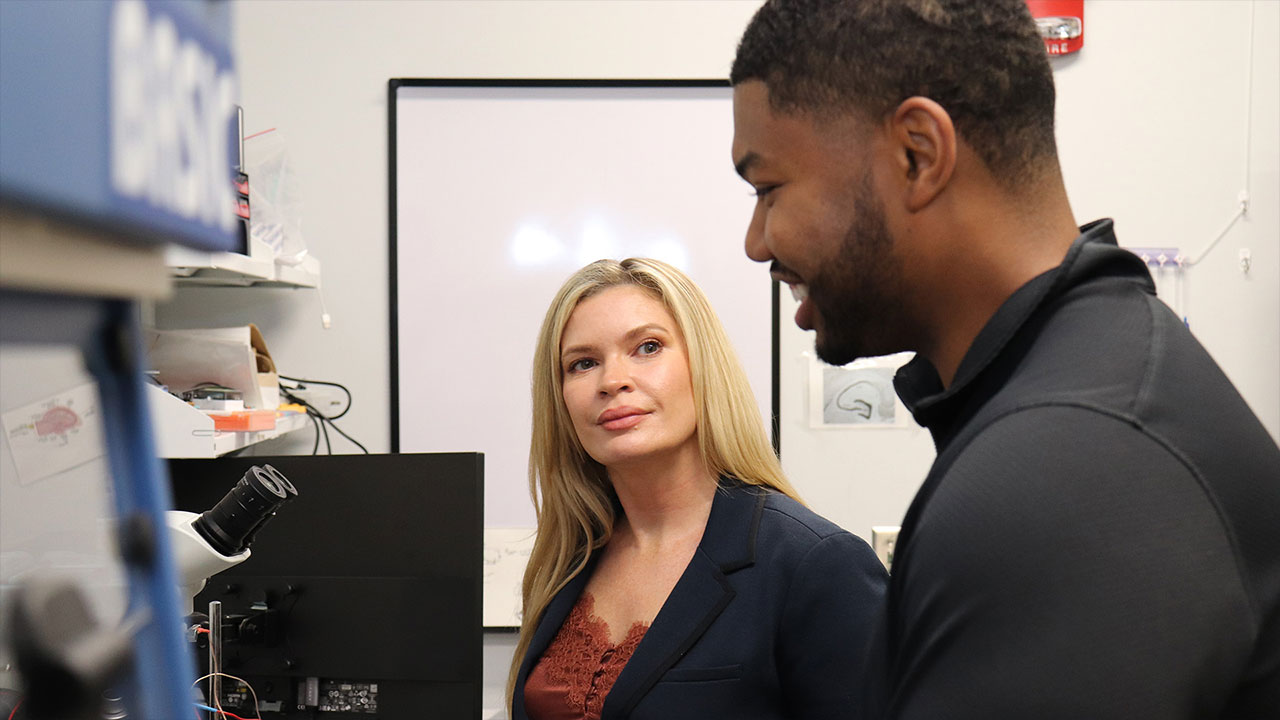content body

Professor Miranda Reed’s research increases the understanding of Alzheimer’s disease.
Auburn University’s Professor Miranda Reed is living out many aspiring scientists’ dreams — she’s a tenured professor within the Harrison College of Pharmacy who has secured more than $6.6 million in research funding. She’s now a recent recipient of the Provost Award for Faculty Excellence in Research Mentoring.
But her path to scientific success wasn’t all smooth sailing. The Lawrence County, Alabama native didn’t always see people like her — a first-generation, female college student — during training.
“I had an idea that I wanted to go through a scientific path, but I did not know how to actually go about getting there,” she said. “I was very lucky because when I was an undergrad, one of my professors asked me to do some research in his lab, and that was sort of the gateway.”
Now, Reed, a three-time Auburn graduate, opens her lab doors for diverse students. She’s trained more than 60 students in her lab, many of whom are from underrepresented backgrounds and have continued on to graduate school.
“It’s really just about bringing people together, putting them in a position where they can really grow, shine and be confident and then watching them flourish,” she said. “I just love that.”
Together, she works with her lab team on pressing concerns, including advancing understanding of Alzheimer’s disease — a type of dementia that’s the seventh-leading cause of death in the U.S.

Miranda Reed, a recent recipient of the Provost Award for Faculty Excellence in Research Mentoring, has trained more than 60 students in her lab, including doctoral student Miles Wiley, right.
Finding the synaptic sweet spot
The brain is a nuanced and delicate organ. Within it, a network of neurons communicate with one another in the space between them, known as the synapse, through molecular messengers called neurotransmitters.
“The way that memory works is you can have neither too much or too little activity between these neurons — anything beyond this perfect balance, you don’t get memory formation.”
As Alzheimer’s disease accelerates, neurons die and communication is reduced between neurons. Scientists have long thought a protein called “tau” is the culprit, by embedding itself within neurons to disrupt functioning, until Reed and her team made a novel discovery.
“If we look at the brain in the years that proceed Alzheimer’s disease, there’s actually too much communication in the brain,” Reed said.
They found tau was actually increasing activity between neurons, sparking the release of a neurotransmitter called glutamate into the synapse. Glutamate signals for an overabundance of calcium to enter the cells, which eventually leads to the loss of neurons.
Understanding what’s happening in a brain in early stages of Alzheimer’s has given Reed helpful information for developing treatments to combat it. Already, Reed said there are FDA-approved drugs on the market designed to decrease glutamate levels.
Reed is currently working with drug companies to test some of these options. In a recently published paper in the Journal of Neurochemistry, they found a drug called troriluzole has potential as a treatment.
“We showed that this drug fixed the presynaptic effect of too much glutamate release, and by doing so, rescued the synaptic plasticity and memory deficits that we observed in animal models of Alzheimer’s disease,” she said.
The next step in her research is to uncover risk factors for Alzheimer’s disease. That way, scientists can take a preventative approach by targeting treatments for patients before the disease is advanced.
Be a part of the next generation of pharmaceutical leaders.
The journey starts here
Miranda Reed, middle, and two members of her lab, doctoral student Miles Wiley, left, and master's student Emma Redmon, look through a microscope at an electrode.
Coming ‘back home,’ creating community
Reed has not only garnered significant funding for her own research, she also helps other scientists secure funding — approximately $3.4 million — and find collaborators as director of the Auburn University Center for Neuroscience Initiative.
As part of this group, one of Reed’s goals is to connect junior faculty with one another.
“I can say, ‘Oh, you’re interested in this topic. Well, I know this other scientist who is interested in this, as well,’” Reed said. “Putting those people together makes me so happy. I just feel like that’s how things grow, and that’s how people get their work done.”
Reed juggles this scientific matchmaking with her own research, as well as mentoring undergraduates and graduate students. Unsurprisingly, she says she prefers to be busy.
There’s no place Reed would rather be than on the Plains. She grew up going to Auburn football games with her dad, a factory worker who encouraged her love of reading, along with her mom.
“I really loved Auburn’s environment,” Reed said. “I had done my doctorate here, and I just really wanted to come back if I could. I felt it would be a good place to raise a family, live long term and settle down.”
“I had also met my husband here, so it was kind of like coming home and seeing all my friends again.”




